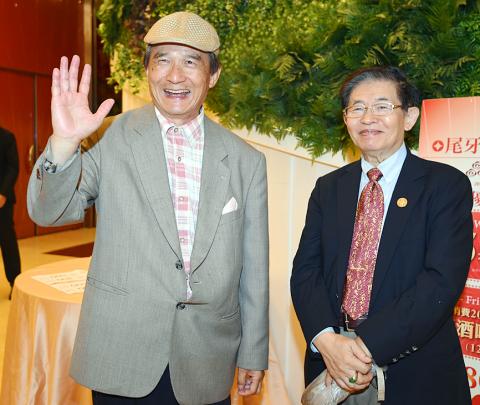Former minister of national defense Michael Tsai (蔡明憲) yesterday said that from his recent talks with former US national security official Stephen Yates, it can be surmised that the new US administration to be headed by president-elect Donald Trump will reassess Taiwan-US relations, which could lead to a major breakthrough in official ties between Washington and Taipei.
Tsai made the remarks in an interview with the Central News Agency, adding that he and Yates are old friends and they met last week for informal talks when Yates was visiting Taipei.
Tsai, who was Taiwan’s deputy representative to the US and deputy secretary-general of the National Security Council, said Yates predicted that the Trump administration will reconsider Washington’s international relationships, which includes US-China and Taiwan-US ties.

Photo: Liao Chen-huei, Taipei Times
“Trump has placed a priority on US interests, therefore opportunities are opening up to broaden ties and exchanges between Taiwan and the US,” Tsai said.
Noting that the US Senate and Congress recently approved the National Defense Authorization Act for the coming year — which is to be implemented when it is signed into law by US President Barack Obama before his term expires — Tsai said that it will be the first time that senior military officials can legally host reciprocal visits and exchanges between Taiwan and the US.
Therefore, when Trump is inaugurated as US president next month, this law would promote major breakthroughs in official ties and exchanges between Taiwan and the US, Tsai said.
He recommended that Taiwan’s foreign affairs institutions lobby Washington for more changes.
Trump has said that he would put the interests of the US first, which would help promote and adjust the Taiwan-US relationship, Tsai said.
“Just as Trump wrote on Twitter that he spoke with the president, so must we take the initiative when these opportunities present themselves,” he said.
Tsai said President Tsai Ing-wen (蔡英文) and foreign affairs officials should lobby Washington to change the name of the de facto consulate in the US to the “Taiwan Representative Office.”
Taiwan’s representative office in Washington is called the Taipei Economic and Cultural Representative Office.
“This move would be opposed by China. We must not sit back and do nothing just because China is against it,” Michael Tsai said.
“It is important to convey the needs and wants of Taiwanese to the US. If we do not stand up on the representative office issue, then the US will not even consider it,” he added.
Chen Chien-jen (程建人), former foreign affairs minister and former representative to the US under the Chinese Nationalist Party (KMT) government, yesterday said that “Taipei” was chosen instead of Taiwan for the representative office name when the US broke official diplomatic ties with Taiwan in 1979 to “avoid indicating any sense of Taiwanese independence at the time.”
“However, I do not believe lobbying for a new name is an urgent matter,” Chen said. “Right now Taiwan needs to steadfastly push forward our foreign affairs policy. It is most important to maintain cross-strait peace and security, and enhance our relationship with the US.”

AIR SUPPORT: The Ministry of National Defense thanked the US for the delivery, adding that it was an indicator of the White House’s commitment to the Taiwan Relations Act Deputy Minister of National Defense Po Horng-huei (柏鴻輝) and Representative to the US Alexander Yui on Friday attended a delivery ceremony for the first of Taiwan’s long-awaited 66 F-16C/D Block 70 jets at a Lockheed Martin Corp factory in Greenville, South Carolina. “We are so proud to be the global home of the F-16 and to support Taiwan’s air defense capabilities,” US Representative William Timmons wrote on X, alongside a photograph of Taiwanese and US officials at the event. The F-16C/D Block 70 jets Taiwan ordered have the same capabilities as aircraft that had been upgraded to F-16Vs. The batch of Lockheed Martin

GRIDLOCK: The National Fire Agency’s Special Search and Rescue team is on standby to travel to the countries to help out with the rescue effort A powerful earthquake rocked Myanmar and neighboring Thailand yesterday, killing at least three people in Bangkok and burying dozens when a high-rise building under construction collapsed. Footage shared on social media from Myanmar’s second-largest city showed widespread destruction, raising fears that many were trapped under the rubble or killed. The magnitude 7.7 earthquake, with an epicenter near Mandalay in Myanmar, struck at midday and was followed by a strong magnitude 6.4 aftershock. The extent of death, injury and destruction — especially in Myanmar, which is embroiled in a civil war and where information is tightly controlled at the best of times —

China's military today said it began joint army, navy and rocket force exercises around Taiwan to "serve as a stern warning and powerful deterrent against Taiwanese independence," calling President William Lai (賴清德) a "parasite." The exercises come after Lai called Beijing a "foreign hostile force" last month. More than 10 Chinese military ships approached close to Taiwan's 24 nautical mile (44.4km) contiguous zone this morning and Taiwan sent its own warships to respond, two senior Taiwanese officials said. Taiwan has not yet detected any live fire by the Chinese military so far, one of the officials said. The drills took place after US Secretary

THUGGISH BEHAVIOR: Encouraging people to report independence supporters is another intimidation tactic that threatens cross-strait peace, the state department said China setting up an online system for reporting “Taiwanese independence” advocates is an “irresponsible and reprehensible” act, a US government spokesperson said on Friday. “China’s call for private individuals to report on alleged ‘persecution or suppression’ by supposed ‘Taiwan independence henchmen and accomplices’ is irresponsible and reprehensible,” an unnamed US Department of State spokesperson told the Central News Agency in an e-mail. The move is part of Beijing’s “intimidation campaign” against Taiwan and its supporters, and is “threatening free speech around the world, destabilizing the Indo-Pacific region, and deliberately eroding the cross-strait status quo,” the spokesperson said. The Chinese Communist Party’s “threats